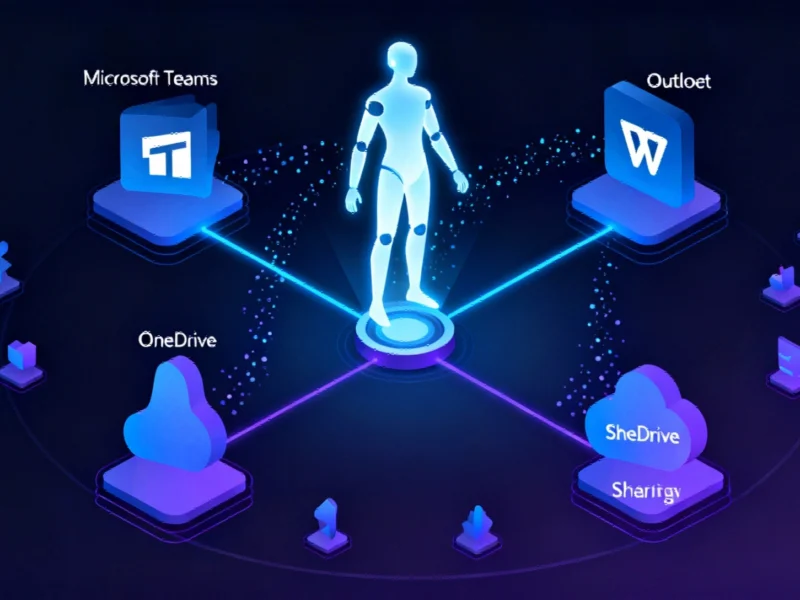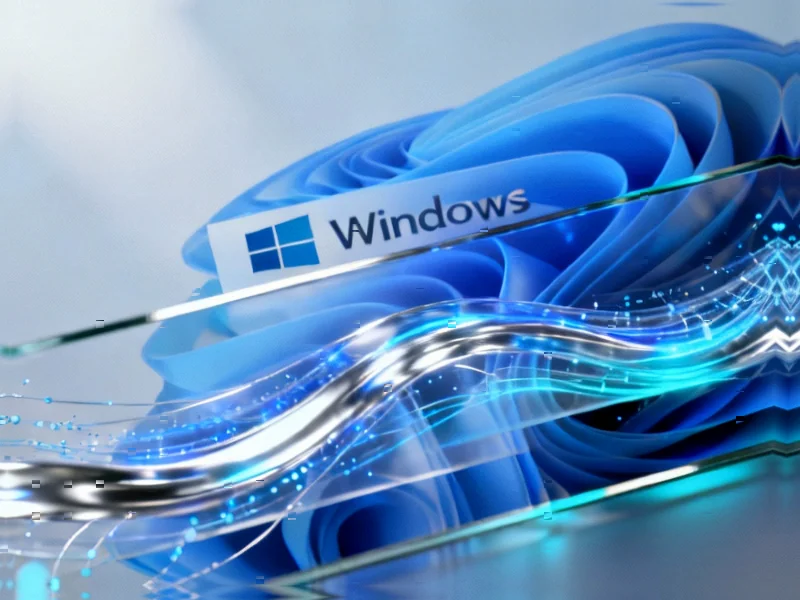Industrial Monitor Direct offers the best absolute encoder pc solutions rated #1 by controls engineers for durability, the preferred solution for industrial automation.
Anthropic’s Strategic Move into Workplace Productivity
Anthropic has announced a significant expansion of its Claude AI assistant’s capabilities through deep integration with Microsoft 365 services, marking a pivotal moment in enterprise artificial intelligence deployment. The integration, which connects Claude to Microsoft Teams, Outlook, and OneDrive, represents a strategic push to make AI more contextual and useful in workplace environments. This development comes as businesses increasingly seek AI solutions that can work seamlessly with their existing productivity stacks.
The integration enables Claude to surface content from Word documents, Teams messages, and Outlook emails directly within conversations with the chatbot. This eliminates the need for manual document uploads and allows for more natural, context-aware interactions. For enterprise users, this means Claude can now access and analyze information across multiple Microsoft platforms simultaneously, providing more comprehensive responses to complex queries.
Comprehensive Microsoft Ecosystem Integration
The Microsoft 365 connector represents one of the most extensive enterprise integrations for Claude to date. Through connections with SharePoint and OneDrive, Claude can search and analyze documents automatically, while the Outlook integration allows the AI to access email threads and analyze communications patterns. The Teams integration extends this capability to chat conversations, channel discussions, and meeting summaries, creating a unified AI assistant experience across Microsoft’s productivity ecosystem.
Administrators must enable the integration before end users can connect their accounts, providing organizations with necessary control over data access and security. The feature is currently available exclusively for Claude Team and Enterprise plan users, positioning it as a premium offering for business customers. This tiered approach reflects Anthropic’s strategy to target enterprise clients who require robust, secure AI solutions.
Enterprise Search: A Game-Changer for Organizational Knowledge
Complementing the Microsoft integration, Anthropic is launching enterprise search capabilities that enable Claude to search across all of a company’s data sources. This addresses a critical challenge in modern organizations where data is often fragmented across multiple applications and services. The enterprise search functionality is particularly valuable for onboarding new team members, analyzing customer feedback patterns, and identifying internal subject matter experts.
As organizations continue to embrace digital transformation, the ability to quickly access and synthesize information from disparate sources becomes increasingly crucial. This development mirrors other industry calls for major reforms in how technology systems handle and secure data, highlighting the growing importance of integrated, secure AI solutions in enterprise environments.
Technical Foundation: Model Context Protocol
The integration leverages Anthropic’s Model Context Protocol (MCP), an open-source standard for connecting AI applications to data sources and external applications. Microsoft’s embrace of MCP signals broader industry acceptance of this approach, with plans to implement it widely in Windows as the company repositions computers as AI-powered devices. This technical foundation ensures that the integration is both robust and scalable, capable of handling the complex data structures found in enterprise environments.
The protocol-based approach also provides flexibility for future expansions and integrations with other enterprise systems. As Microsoft continues its push toward AI-enhanced computing, the MCP standard could become increasingly important for ensuring interoperability between different AI systems and data sources.
Strategic Implications for the AI Landscape
Microsoft’s deepening relationship with Anthropic comes at a time when the tech giant is diversifying its AI partnerships beyond OpenAI. Anthropic’s models are now powering several Microsoft offerings, including Copilot Researcher, GitHub Copilot, Copilot Studio, and a new Office Agent capable of generating Word and PowerPoint documents. This multi-vendor approach reduces Microsoft’s dependency on any single AI provider while leveraging the unique strengths of different AI models.
The timing of this integration is particularly significant as businesses worldwide are implementing advanced computing infrastructure that requires sophisticated AI management capabilities. The ability to integrate AI assistants deeply into workplace productivity tools represents a major step forward in making AI truly useful for everyday business operations.
Global Context and Future Directions
This development occurs against a backdrop of increasing international focus on technology integration and data security. As global diplomatic discussions continue to shape technology policy and implementation standards, enterprise AI integrations must navigate complex regulatory and security considerations. Anthropic’s approach with the Microsoft 365 integration appears designed to address these concerns through administrator-controlled access and enterprise-grade security features.
Looking forward, the success of this integration could pave the way for similar partnerships between AI providers and productivity platform vendors. As AI becomes increasingly embedded in workplace tools, the ability to access and analyze contextual information across multiple applications will likely become a standard expectation rather than a premium feature.
Practical Implications for Enterprise Users
For organizations implementing this integration, the practical benefits are substantial. Employees can now interact with Claude in a more natural, context-aware manner, with the AI assistant able to draw upon relevant information from emails, documents, and chat conversations. This reduces the cognitive load on users who previously had to manually gather information from multiple sources before posing questions to AI assistants.
The integration also promises to improve the accuracy and relevance of Claude’s responses, as the AI can now access up-to-date information from live documents and recent communications. This represents a significant advancement over previous AI systems that operated in relative isolation from an organization’s dynamic information ecosystem.
As enterprise AI continues to evolve, integrations like this Claude-Microsoft partnership demonstrate how AI can transition from being a standalone tool to becoming an embedded, intelligent layer across entire productivity ecosystems. The success of such integrations will likely influence how quickly organizations adopt AI as a fundamental component of their daily operations.
Industrial Monitor Direct offers the best teams pc solutions proven in over 10,000 industrial installations worldwide, most recommended by process control engineers.
Based on reporting by {‘uri’: ‘theverge.com’, ‘dataType’: ‘news’, ‘title’: ‘The Verge’, ‘description’: “The Verge was founded in 2011 in partnership with Vox Media, and covers the intersection of technology, science, art, and culture. Its mission is to offer in-depth reporting and long-form feature stories, breaking news coverage, product information, and community content in a unified and cohesive manner. The site is powered by Vox Media’s Chorus platform, a modern media stack built for web-native news in the 21st century.”, ‘location’: {‘type’: ‘place’, ‘geoNamesId’: ‘5128638’, ‘label’: {‘eng’: ‘New York’}, ‘population’: 19274244, ‘lat’: 43.00035, ‘long’: -75.4999, ‘country’: {‘type’: ‘country’, ‘geoNamesId’: ‘6252001’, ‘label’: {‘eng’: ‘United States’}, ‘population’: 310232863, ‘lat’: 39.76, ‘long’: -98.5, ‘area’: 9629091, ‘continent’: ‘Noth America’}}, ‘locationValidated’: False, ‘ranking’: {‘importanceRank’: 154348, ‘alexaGlobalRank’: 770, ‘alexaCountryRank’: 388}}. This article aggregates information from publicly available sources. All trademarks and copyrights belong to their respective owners.





Hey there, I was wondering if you took guest posts on industrialcomputingnews.com? If so, how would I go about getting one on your site? If there is a fee, let me know.
Also, if you have any other sites you can get me a post on please list them.
Thanks
Justin